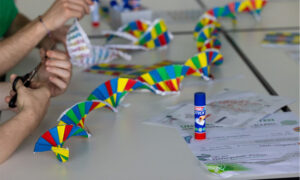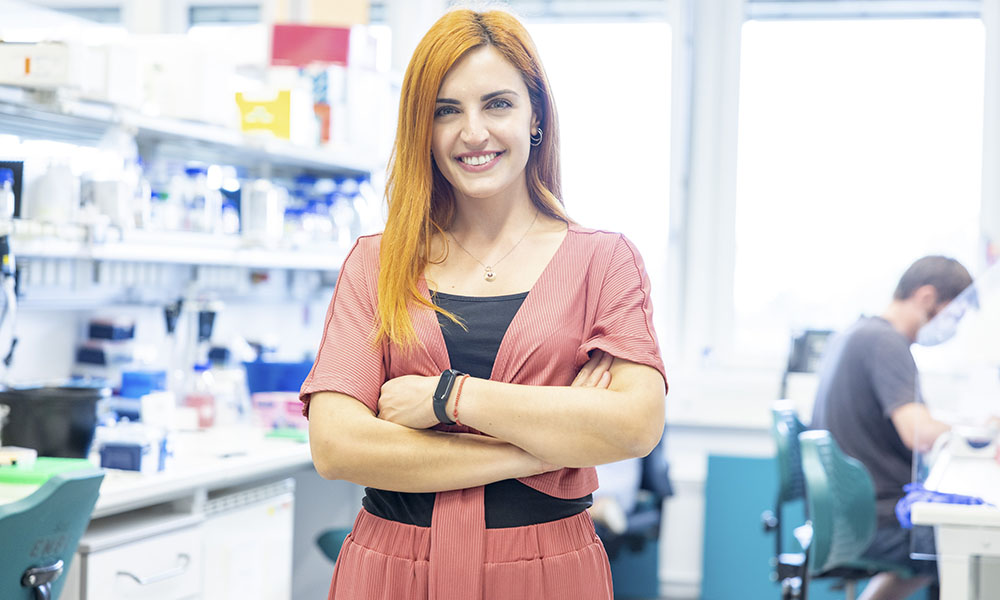
Read the latest Issue
EMBL’s Visitor Programme offers top-of-the-line access to research expertise and tools, taking science projects to new levels

In Spain, Brais Bea-Mascato had used a gene editing tool to reproduce two rare and complex genetic disorders – Alström syndrome and Bardet-Biedl syndrome – in normal cultured cells. Using various omics technologies, he hopes to shed light on the alterations that ultimately lead to disease progression. But, this had generated a wealth of hard-to-understand data.
In Greece, Virginia Fasoulaki was wrestling with challenges in her PhD research that explored the adaptability of intestinal stem cells in fruit flies (Drosophila melanogaster). She was interested in unravelling the epigenetic variations that control the role these particular stem cells ultimately play. But she needed expertise in state-of-the-art genomics approaches that can use very low-input samples to do her experiments.
In both of these cases, a short stint at EMBL, working with its world-class researchers and tools, proved to be just the thing to move past research obstacles. Even in a relatively short time, Bea-Mascato and Fasoulaki could obtain the necessary skills and knowledge. And thanks to EMBL’s Corporate Partnership Programme (CPP) and the Friends of EMBL, they received support that made a visit to EMBL possible through EMBL’s Scientific Visitor Programme.
“We’ve seen again and again how the Scientific Visitor Programme can really boost young researchers’ work with the access they gain to EMBL’s state-of-the-art technology platforms and associated expertise at all of EMBL’s sites,” said Claudia Martin, EMBL Visitor Programme Manager. “They get first-rate training and support that usually exceeds the boundaries of their stay at EMBL.”
For Fasoulaki, it meant learning a technique known as transposase-based CUT & Tag in the Furlong group. This technique, in addition to follow-on bioinformatics training, will enable her to measure changes in chromatin states in stem cells after different mutations, and it equips her to analyse the resulting data.
“The Furlong lab has emerged as one of the top groups internationally in chromatin biology and has pioneered many approaches in Drosophila,” she said. “Their expertise in CUT & Tag profiling, in combination with EMBL’s top-notch core facilities, is now enabling me to carry out my proposed experiments and get my PhD project one step further.”

Likewise, Bea-Mascato found his research world expanded too, through preliminary discussions with the Petsalaki group at EMBL-EBI, which works on deciphering cell signalling. Upon visiting the Petsalaki lab, he was introduced to new techniques, such as semantic similarity and network propagation. The result was a fast-paced, hands-on, and practical bioinformatics training that he could apply to his own research.
“With mostly wet-lab experience and a lack of researchers doing similar experiments at my own university, I knew data analysis would be challenging without expert help. From day one, Evangelia Petsalaki was tremendously open-minded and helpful,” he said. “I have come to understand that omics technologies provide increasing accuracy and decreasing costs for proper data analysis, an important challenge in modern biology. It’s also something I would love to work on in the future. This requires developing a kind of logic and way of thinking that this stay allowed me to develop.”
And this is the kind of growth that EMBL had envisioned with its visitor programme. Though these most recent EMBL visiting scientists were working on their PhDs, the programme also includes postdoctoral fellows in EMBL’s collaborative and multidisciplinary scientific atmosphere.
“The support allows young scientists to join EMBL and work on short- to medium-term projects in a collaborative, multidisciplinary scientific atmosphere,” said Jürgen Deka, Head of External Scientific Training.
Additionally, thanks to support from EMBL’s CPP and the Friends of EMBL, EMBL can defray some costs associated with travel and housing for participants who otherwise would not have been able to afford this experience. Friends of EMBL is a network for anyone interested in life sciences, and in supporting EMBL’s research and missions.
The CPP fellowships programme accepts applications four times per year. Applicants start the process by reaching out to EMBL scientists who they believe will be best suited to consult with them on their research and take it to the next level. Acceptance is always dependent on mutual interest shared with the EMBL host.
Founded in 2009, CPP primarily promotes and facilitates exchange and cooperation at the frontier of science between leaders from industry, EMBL‘s research community, and world-leading scientific facilities. Currently, 21 companies are part of the programme and contribute to EMBL’s training mission. CPP fellowships for scientific visitors support the collaboration of young external researchers and EMBL groups by offering financial support of up to €2,000 per applicant and are designed to enable the mobility of PhD students and postdocs to access EMBL’s sites. Preference is given to cases that support cross-border mobility to encourage greatest participation from EMBL member states. However, recipients have also come from other countries.
“The agility and speed with which the selection process for this fellowship was carried out were among its greatest virtues,” Bea-Mascato said. “Being selected for a grant that allowed money to be available during the stay was a financial relief that undoubtedly allowed me to focus on the science I wanted to develop at EMBL-EBI.”
“What prompted me to apply for this fellowship was that there are no restrictions on scientific background, country of origin, or personal states. Plus, they hold selection rounds every three months, and the application is really easy to submit,” Fasoulaki offered. “In my case, EMBL funding not only supported my travel and a big part of the accommodation costs, it enabled me to prolong my visit.”
Applications are accepted at the end of each quarter, and interested scientists from other organisations, and who have an EMBL host, are encouraged to apply. The next application deadline is 30 September. “It’s been great to interact with innovative researchers from all over the world that make up EMBL’s scientific community,” Fasoulaki said. “I have broadened my research horizons and enhanced my scientific research long term. With EMBL’s renowned expertise in genomics, I think this was the right place for me to be!”
Looking for past print editions of EMBLetc.? Browse our archive, going back 20 years.
EMBLetc. archive